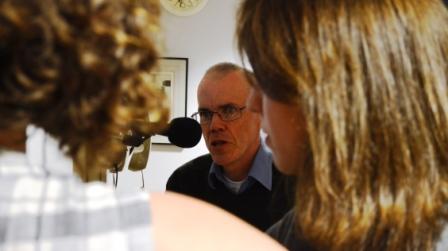McKibben Talks about Climate Change in Landmark College Speaker Series
by Solvegi Shmulsky
On Tuesday, October 22nd, internationally published author and environmentalist Bill McKibben spoke to a packed auditorium at the Landmark College Greenhoe Theater. Approximately 330 people from the College community and the Putney area registered for McKibben’s talk based on his new book Oil and Honey: The Education of an Unlikely Activist. This free public event was part of the 2013 fall Speaker Series.

Underscoring McKibben’s message, Dr. Peter Eden, president of Landmark College, commented on the magnitude of the environmental problems that we face. He said, “We need to be aware that a climate change, likely due to carbon emissions from our society and lifestyles, is more than merely injurious to ecosystems and environments around the globe. And that all solutions are worthy of reasoned consideration from a moral, symbolic, and practical perspective.”
With accessible language and photos, McKibben presented problems and solutions of a huge magnitude that stretch across every continent. He cited indicators of global warming including increased ocean acidity, a wetter atmosphere, and historic droughts and weather events—in addition to an increased air temperature of one degree Celsius, the most direct measure of a warmer planet.
After highlighting the environmental problem facing citizens across the globe, McKibben delved into the advocacy efforts of his foundation 350.org, named for a target safe quantity of atmospheric CO2—350 parts per million—which is less than the current estimate of 400 ppm. McKibben said the purpose of 350.org is to “take this number and drive it into the bloodstream of the planet.” On its first international rally day, 350.org was responsible for 5,200 demonstrations in 181 countries. Since then, 20,000 rallies to support reducing carbon use have mobilized around the world, and these rallies target fossil fuel giants as the most culpable perpetrators of global warming.
To complement the statistics, which point to vast global changes that are difficult to fully comprehend, McKibben showed photos of college students, children, families, and elders engaged in various 350.org demonstrations. Diverse cultures, races, styles of dress, and climates were shown, but all photos shared a common thread—350.org was prominently and creatively displayed in each image. While scrolling through images, McKibben urged the college to prioritize divesting, or selling-off, the stocks of companies that earn profits from fossil fuel.
Community members are making the most of their role as change agents—scores of students attended McKibben’s talk and an online petition for divestment is up and running. The online petition asks the president of the College and the Board of Trustees to freeze new purchases of energy stocks and to divest its endowment portfolio of energy stocks within five years.
In response to rising interest on campus about climate change, President Eden has encouraged student participation and dialogue on this topic. He has addressed the subject of energy investments in a letter to the community and has made himself accessible to The Independent, and other constituents who want to talk.
When asked about divestment, Dr. Eden expressed a willingness to examine the possibility while also offering a reminder that solely focusing on divestment may oversimplify this large, complex problem. He said, “Like many other post-secondary institutions, we will examine the pros and cons of energy sector divestment. Thinking broadly, we should also be aware of the comparatively small global return we would see from efforts focused only in that area, when the complex global warming crisis is actually being driven by many other powerful forces and entities such as governments, not just a handful of publicly traded energy companies.”
The message delivered to campus by Bill McKibben, the response of the community, and the leadership of President Eden illustrate a campus engaged in an important contemporary issue. The McKibben event and ensuing dialogue fulfill the mission of the fall 2013 Speaker Series, which is to deliver “insight and an edge of social criticism, and offer explanations of current change that open up the potential inherent in evolution—that of a better future.”
Landmark College was the first institution of higher learning to pioneer college-level studies for students with dyslexia. Today Landmark College, offering two and four-year degree options, a graduate level certificate in universal design with technology integration, and summer programs for students who learn differently, is a global leader in integrated teaching methods for students with dyslexia and other learning disabilities, ADHD, and ASD. Students, faculty, and other professionals from all over the world are drawn to Landmark College for its innovative educational model—designed through research and practice to help all students who learn differently become confident, self-empowered, and independently successful learners.